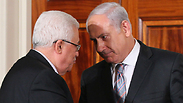
Netanyahu and Abbas. 'Without a political horizon, we must begin countdown ahead of next round'
צילום: GettyImages
Creating a strong axis for peace
Op-ed: Lack of vigorous activity for a reality of two states for two people is Israeli leadership's main failure in past decade.
The balance of achievements and costs of the recent round of fighting focuses on issues of secondary importance. The main issue that should be placed on our leaders' agenda is how Israel can preserve its Jewish and democratic character while guaranteeing its security.
This can only be done if we create a reality of two states for two people. The lack of vigorous activity to create such a reality is the main failure of the state's leadership in the past decade. This failure is bigger than any military, civilian or diplomatic move during the fighting.
Israel is paying for this failure and will continue to pay a very high price, led by the loss of Israel's democratic identity as we are tragically witnessing these days, growing international isolation and its "upgrade" to sanctions and boycotts which may lead to an economic collapse, as well as the alienation of broad Jewish publics worldwide towards Israel on the one hand, and growing hostility against Jews around the world on the other hand.
This is all taking place even before we discuss the heavy, bloody security price of the ongoing rounds of fighting. But it's not only because of all these risks that Israel should take an initiative to guarantee its future, but simply because it is in the best interest of the state and its citizens.
The implementation of the Zionist vision of a national home for the Jewish people requires a political solution for the Israeli-Palestinian conflict. While fighting Islamic terror uncompromisingly, the Israeli interest requires three main intertwined policy efforts which support and complement each other:
1. Pursuing an acceptable solution to the Israeli-Palestinian conflict based on the principle of two states for two people.
2. Initiating the formation of a regional axis based on shared interests for diplomatic, economic and security-related cooperation between Israel, Egypt, Jordan, Saudi Arabia and the Persian Gulf countries with the support of the Quartet and led by the United States.
3. Adopting an initiated and unconditional policy guaranteeing the democratic existence of the State of Israel as the national home of the Jewish people, including encouraging the return of Israelis living in areas east of the fence.
Israel must advance simultaneously on these three axes and must not condition the further advancement towards a reality of two states based on difficulties which might delay the advancement on one of them.
Such advancement is the only way to restore Israel's credibility as a country which is really pursuing the end of the conflict. On each of these axes, Israel must adopt an initiated policy of leading the process to its successful conclusion.
On the agreement axis: Pursuing a permanent agreement which will secure the establishment of an independent Palestinian state based on the 1967 lines with a land swap on the borders, which will consider the State of Israel's security-related and demographic needs.
In particular, if an international outline is published for a permanent agreement based on the Arab peace initiative, Israel should accept it in principle, announce that it is willing to resume negotiations on the agreement's details at any time, and once the agreement is formulated – it will be subject to a referendum or general elections.
On the regional axis: Working with the region's countries and the Palestinian Authority to formulate an outline for rebuilding Gaza and a call for an international committee to discuss the future of the Palestinian state.
The successful conclusion of the negotiations according to the Arab peace initiative, with the required amendments, will make it possible to establish peace with most of the region's countries and create a strong axis against the fundamentalist Islam.
On the unconditioned axis:
- Halting (rather than freezing and then resuming) the settlement east of the fence and in East Jerusalem's Arab neighborhoods.
- Handing areas beyond the fence over to the Palestinian Authority led by Mahmoud Abbas in a gradual and controlled manner, while maintaining the military presence required for Israel's security.
- Advancing the enactment of an "absorption, compensation and voluntary evacuation" law to encourage the return of settlers who wish to come back before an agreement is signed, and preparing a national plan to take in the settlers returning into Israel's boundaries (whether before or after an agreement is signed) as an expression of the state's deep commitment to the settlers whose mission has come to an end.
These steps will support advancement on the other axes. But even if we fail to reach an agreement, advancing on the unconditioned axis will make it possible for Israel to formulate its borders around a clear Jewish majority and restore Israel's credibility in regards to the sincerity of its intentions to reach a two-state solution, and will therefore lead to a dramatic drop in the prices Israel is paying for the status quo.
Securing a Jewish majority within Israel's sovereign area and curbing the possibility of a bi-national state require our public representatives to take responsibility. The current battle in Gaza and the transformations in the Arab world have created a rare opportunity for regional and international cooperation.
We must work today to secure the State of Israel's Jewish and democratic identity for the generations to come. Without a move creating a political horizon, we must begin the countdown ahead of the next round.
Ami Ayalon, Gilead Sher and Orni Petruschka are the founders of the Blue White Future movement.










